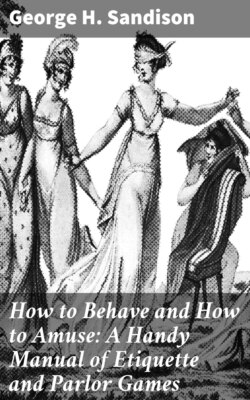Читать книгу How to Behave and How to Amuse: A Handy Manual of Etiquette and Parlor Games - George H. Sandison - Страница 16
На сайте Литреса книга снята с продажи.
Breakfasts, Luncheons, Teas and Suppers.
ОглавлениеTable of Contents
These, and all similar entertainments of the “At Home” order, are much less formal than the dinner event. The breakfast invitation should read in the customary form, and at the right hand lower corner the words:
“Breakfast at ten o’clock,
March 15.”
This breakfast should not be elaborate, but dainty in its food and appointments. The best of everything, prepared in the choicest of styles, but nothing heavy, nor excessive in quantity, should be prepared. Walking costumes are worn by both gentlemen and ladies, also visiting-gloves, which are removed at table. The descent from the dressing-room and greetings between the hostess and guest are just the same as at a dinner-party.
Suppers are usually gentlemen parties; and from nine to ten o’clock is the usual time for them to be served. There are game suppers, fish suppers, and several other kinds of suppers, each one of which differs in the appropriate supplies for the table. But the formalities of the occasion, or, rather, the informalities, are all of the same kind. The invitations may be made at interviews, by friendly notes, or by the host’s visiting-card, with this, written upon it:
SUPPER AT TEN O’CLOCK,
Thursday, September 16.
If it is a fish supper, only little food except that which once lived in the water is provided; salads and fruits, without a sweet dessert, complete it, with the addition of coffee.
It was surely a gracious social benefactor who introduced the afternoon reception which, between the hours of four and six, summons a host of friends to cross one’s threshold and meet informally, over a social cup of tea, each group giving place to others, none crowding, all at ease, every one accorded a gracious welcome from the hostess, who thus has tacitly placed each guest on her evening list for the season. The afternoon reception is much the same, whether it be a tea merely, or a musicale, or a literary occasion. Conversation and the chat of society, the greeting of friends, the tea and its pleasant accessories, fill a half-hour or so very pleasantly. When a musicale is given, it is usually in honor of some favorite amateur, a pianist, singer or reader. Under such conditions the invitation cards should be a little more explicit, and may state “Music at 4,” or whatever the feature of the reception or sociable may be. Tea is served in the same room, when the guests are few, and in another room if the reception be crowded. Usually a single table is set, with coffee or chocolate at one end, and tea at the other, served by young ladies. To be invited to preside at the coffee-urn, or tea-kettle, is accounted a high compliment. The refreshments may be very thin slices of bread and butter, or wafers, or similar trifles; but if the occasion approaches the nature of a formal reception a more elaborate preparation is made, and bouillon, oysters, salads, ice-cream and cakes, delicate rolls and bonbons may be offered.
